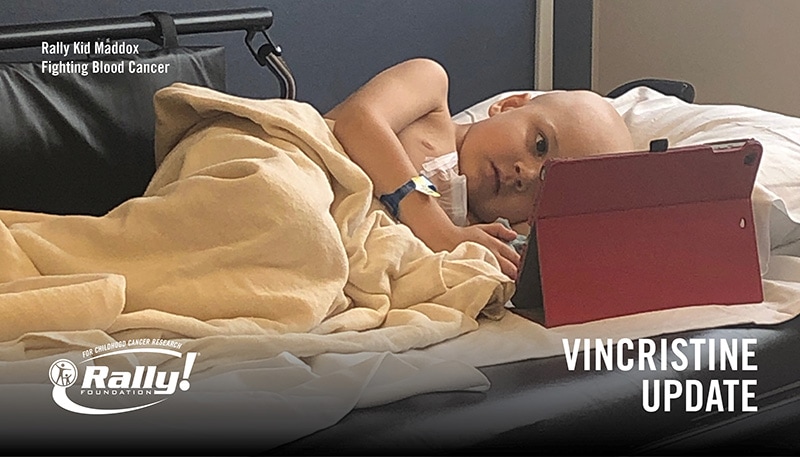Vincristine Shortage – Update and Action

To the childhood cancer community:
As Chair of the Children’s Oncology Group (COG), I am sending this letter to the childhood cancer community to share information we have related to the current vincristine drug shortage, summarize steps we understand are being taken to help resolve the shortage, and to propose an approach that would benefit from an advocacy effort to help address the ongoing challenge of drug shortages that directly impact children with cancer.
Vincristine Shortage
At the beginning of October, pharmacists at COG member institutions raised concerns about the ability to obtain vincristine. COG quickly contacted Pfizer/Hospira, now the sole supplier of vincristine in the United States, and was told that Pfizer/Hospira was experiencing a shortage of drug due to a manufacturing delay. (The other supplier of vincristine in the US, Teva Pharmaceuticals, made a “business decision” and stopped supplying drug to the US in July of 2019.) COG then contacted Captain Valerie Jensen, RPh, Associate Director of the Drug Shortages Staff at the FDA, to share this information. She reported that FDA had been contacted by Pfizer/Hospira, were exploring the drug shortage and had started working on potential solutions. An FDA update this morning stated that Pfizer/Hospira now expects vincristine distribution to resume by the end of October. We are hopeful that this distribution will help avert more patients not being able to receive drug as scheduled.
Members of the Children’s Oncology Group strongly believe that every child with cancer whose treatment requires vincristine should receive the drug as scheduled, and that a situation that requires rationing of drug is unacceptable. We and others have had long- standing concerns about the impact of drugs shortages for children with cancer, and believe that while legislation enacted in July of 2012 with Title X of the Food and Drug Administration Safety and Innovation Act (FDASIA) was helpful and important, it did not address key underlying factors that lead to shortages.
We are greatly concerned that some children are already being impacted by this shortage and by the understandable anxiety this creates for all families of children with cancer. We have previously published guidelines to help physicians who may be forced to ration drug about approaches to consider, along with steps hospitals can take to minimize the impact of a drug shortage. To emphasize again, we find the situation forced upon pediatric oncologists and families of children with cancer unacceptable (see call to action below) but welcome the news that drug distribution should be resuming soon.
Brief Background on Drug Shortages
Since the frequency of cancer drugs shortages began to significantly increase about 10 years ago, many studies and experts have weighed in on causes and possible solutions. While the issues that lead to shortages are complex and involve aging manufacturing facilities overseas and a consolidation of suppliers, I think it is fair to point out that (1) the US is impacted to a significantly greater extent than Europe, and (2) economic factors underly many of the shortages. Drug shortages primarily involve generic sterile injectables (drugs that are given intravenously) and continue to occur with many types of medicines, not just cancer drugs. Although perhaps not the primary cause, Medicare payment reform enacted in 2003 capped the amount that could be charged for IV drugs prescribed by physicians at 6% over the “average sales price,” adjusted every 6 months. In 2019, the average sales price for a vial of vincristine was about $5; thus, the economics of supplying drugs like vincristine are challenging. In Europe, a significantly higher amount is spent on generics (and a lower amount on newer drugs). The bottom line is that longterm solutions to this problem involve US Medicare regulations, economic and other policies (and are well beyond my expertise).
Call to Action
While it is clear that the immediate concern and goal is to solve the issue surrounding vincristine, I believe the community should consider advocacy steps to help prevent future shortages of life-saving cancer drugs for children. In my view, as related efforts are developed for longer term, economic policy solutions, we need to focus on solutions for today’s children with cancer. In the upcoming days and weeks, I am hopeful we can arrive at focused action items for advocacy solutions that have the goal of guaranteeing cancer drug supplies for children in the United States. Proposals that could be enacted in a reasonable time frame for today’s children that merit consideration include but are not limited to (1) establishment and maintenance of a national stockpile of key cancer drugs used for the treatment of children with cancer and (2) US government purchasing contracts that provide a guaranteed buyer and may help stabilize a fragile market. There undoubtedly are other ideas to consider, and we are committed to working with the community and childhood cancer advocacy groups in galvanizing these efforts.
Closing Comments
Our first priority must continue to be today’s children with cancer who need vincristine as part of their treatment. We greatly appreciate the initial efforts by the FDA and Pfizer/Hospira. As we await further information, we look to them for additional steps, such as potentially allowing importation of vincristine from other countries, that could be considered for patients currently being impacted. While we (and many others) are infuriated that this situation has occurred at all, we should do our best to have advocacy efforts stay focused on solutions. I am hopeful we can take this unacceptable crisis and move towards better answers, always keeping the interests of patients and families central to our efforts.
For any family that is currently having difficulty obtaining vincristine for their child, the FDA recommends that you contact them at [email protected].
Thank you all for your support. If there are questions that I can answer, please do not hesitate to reach out; I will do my best to track down information.
Sincerely,

Peter C. Adamson, M.D.
Chair, Children’s Oncology Group
Alan R. Cohen Endowed Chair in Pediatrics
Professor of Pediatrics & Pharmacology
Perelman School of Medicine, University of Pennsylvania Children’s Hospital of Philadelphia
